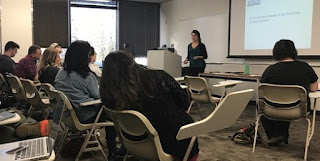
The Department of Corrections (DOC) is the largest provider of mental health services in the state of Alaska. With 33,000 bookings a year,
65% of those booked qualify as beneficiaries of the Alaska Mental Health Trust Authority, including 23% with a serious mental illness, according to
Adam Rutherford, Chief Mental Health Officer for DOC.
In many areas, Alaska lags behind other states, but not in its treatment of the mentally ill in its correctional institutions, Rutherford said.“We are practicing evidenced-based interventions, we are a leader in this area,” he said, adding, “We want to be the gold standard in mental health care.”
 |
L-R: DJJ Clinical Director Shannon Cross-Azbill, DJJ Chief Probation Officer
Heidi Redick, DOC Director of Health and Rehabilitation Services
Laura Brooks and DOC Chief Mental Health Officer Adam Rutherford. |
Rutherford, along with
Laura Brooks, Director of Health and Rehabilitation Services for DOC,
Shannon Cross-Azbill, Clinical Director for the Division of Juvenile Justice (DJJ) and
Heidi Redick, DJJ Chief Probation Officer, spoke at UAA earlier this month in a program sponsored by the
UAA Justice Club on how the mentally ill are being served in both the adult corrections and juvenile justice.
While it is often difficult to diagnose juveniles, DJJ Clinical Director Cross-Azbill said that the
majority of those in DJJ have a mental health diagnosis including substance abuse, ADHD, depression and trauma-related disorders. They’ve recently been keeping track of Fetal Alcohol Syndrome Disorders and found 47% of the juveniles may be experiencing this, she added.
The panelists attributed the high numbers of those with a mental illness in both juvenile and adult systems to be partly in response to a lack of resources outside their systems.
Laura Brooks, who oversees all of DOC’s Health and Rehabilitative Services (HARS), explained the growth in prison treatment of the mentally ill as symptomatic of a shift in the 1960s away from funding state psychiatric hospitals and moving toward community mental health centers that were inadequately funded. Eventually, many of those with mental health issues ended up in correctional institutions, she said.
Not only is DOC Alaska’s largest behavioral treatment center it is also the state’s largest health care provider. It is also the largest medical facility, largest detox center, and substance abuse treatment center. The behavioral health staff has 21,000 contacts with offenders a year, according to Rutherford. The HARS staff of 200 sees 5,000 patients a day inpatient and 4,000 a day outpatient, according to Brooks.
DOC has followed the national movement to
screen people coming into the system to assess : 1) criminogenic risk, 2) need for substance abuse treatment, and 3) need for mental health treatment.
The goal is to have people in a better position when they leave the facilities than when they entered, Rutherford said. This is important, he added, because most of those who are incarcerated return to the community.


















